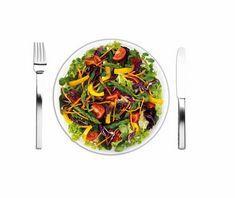
It’s a little over two years since The Lancet published a report that took the debate on sustainable diets to a new level. The study suggested that in order to meet the UK’s targets to cut greenhouse gas emissions by 80 per cent by 2050, livestock production would have to be cut by 30 per cent. As a bonus, the amount of saturated fat consumed would also drop sharply, leading to a 15 per cent reduction in heart disease.
The findings were, unsurprisingly, controversial. Ministers at the Department of Health and Department for Energy and Climate Change backed the findings. Ministers at DEFRA, again unsurprisingly, didn’t. A food fight through Whitehall ensued and no progress was made.
To this day, many in the food industry await policy guidance on what a sustainable diet might look like. Indeed, the idea of a diet that is good for the planet and for the body - a diet that will likely include less meat and more fruit and veg - has become an almost mythical concept. At City University’s food symposium just before Christmas, there was a growing frustration at the lack of progress.
Sue Dibb, now executive director of the Food Ethics Council, said there was lots of information on healthy eating and lots more on green living but “we’re a long way from having joined-up information from government”.
But could this be the chance for food businesses to take the bull by the horns and drive the agenda? Why not create meals that have a little less meat and more of the 5 A DAY? Why not inspire chefs to create more exciting vegetarian options?
“We are in an era where a growing number of consumers - not just vegetarians - are making a lifestyle choice and looking to reduce their meat intake,” says John McKears, foodservice sales manager at Jus-Rol Professional. “Gone are the days when caterers could simply provide a default vegetarian option. There is a captive audience out there actively searching for meat-free dishes.”
The Vegetarian Society suggests that the amount of ‘meat reducers’ - diners opting for meat-free dishes when eating out - could be as high as five per cent. “This is an important change in UK dining habits and the modern menu needs to reflect this,” adds McKears.
Surprisingly, it is a chef notorious for his campaigns around more sustainable meat that is now pushing the agenda for people to eat more vegetables. In a blog for The Guardian, Hugh Fearnley-Whittingstall writes: “Let me be clear: I have not become a vegetarian, nor do I think I ever will. So the dialogue I’m keen to begin with other meat-eaters is not about vegetarianism, it’s about vegetables. I would love to persuade you to eat more vegetables. And thereby to eat less meat - and maybe a bit less fish too. Why? To summarise, we need to eat more vegetables and less flesh because vegetables are the foods that do us the most good and our planet the least harm.”
WWF-UK has come closest to identifying the make-up of a sustainable diet. Its ‘Livewell Plate’ report suggested that the average diet, with health challenges and emissions targets in mind, should consist of 35 per cent fruit and veg compared to the recommended 33 per cent in the government’s ‘Eatwell Plate’. “When you look at what we eat it’s quickly evident that there are major overlaps between what’s healthy for the planet and what’s healthy for people,” says Mark Driscoll, head of the One Planet Food Programme at WWF-UK. “This is a win-win that should be exploited fully.”
Indeed, extrapolated across the UK, that’s a lot more fruit and veg. Driscoll says there’s an urgent need to build on this concept and promote sustainable eating habits based on a sustainable diet. “Where businesses lead, hopefully governments will follow,” he says. Duncan Williamson, his colleague on the team, says the NGO is keen to work with the fresh produce industry to get businesses and farmers on side in this debate. “Businesses are starting to engage; even a few of the supermarkets are thinking about dipping a toe in the water,” he adds.
One foodservice business is already knee deep. The California-based contract caterer Bon Appétit has taken steps to drastically cut its purchase of beef and cheese, as well as airfreighted fruit, in a bid to cut its environmental footprint. The firm serves 80 million meals a year and has managed to slash beef consumption by 33 per cent. The group is also helping students set up their own fruit and vegetable gardens on the campuses it caters for.
So far, no UK-based caterer has made such a bold commitment, but it might not be long before some do. The Accor Group, which owns hotel chains including Novotel, Ibis and Sofitel, has just published a unique environmental impact assessment across its entire operation. It threw up some staggering results. One of the most startling involved is its water footprint: 86 per cent of the water consumed by the company is not for laundering sheets, but for rearing livestock and crops - especially beef.
Accor serves 56 million breakfasts a year and Sophie Flak, the group’s executive vice president for sustainable development, understands the impact all that producing such quantities of food can have. People’s diets may well have to change as a result. That won’t be easy, she says, but the company has already set up a working group to look at what Flak describes as “smarter menus”. These could, she hints, include the integration of further vegetarian options over the coming years.
In the years ahead, one thing is for sure: the lines between healthy and environmentally-friendly diets will continue to blur. This will see foodservice companies looking to achieve both ambitions through the design of sustainable menus, and it’ll be the smart operators in fresh produce that make the most of it. -